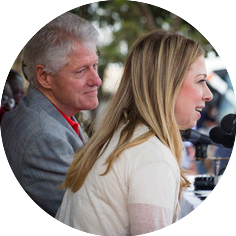Yes, Virginia, There Is Still A Peace Corps
PRESIDENT CLINTON AND CHELSEA CLINTON
[This article by the President and Chelsea Clinton originally appeared in the Chicago Tribune on September 22, 2013. The Peace Corps gets a ‘passing’ reference.]
Great Americans: Community Service Is at the Core of our Country’s National Character
The idea of community service is as old as America itself. Older really. Benjamin Franklin helped form the first volunteer fire department in Philadelphia in 1736, spawning a movement that continues to this day in communities throughout the country. Alexis de Tocqueville, in the 1830s, contrasted America with his native Europe by saying that the central difference was that in America, people didn’t wait for the state to solve problems. They just got organized and tried to figure out what to do about them. Service is at the core of our national character.
In 1933, in the depths of the Depression, FDR created the Civilian Conservation Corps, putting legions of young, unemployed men to work to help conserve not only the country’s natural resources, but also its national character. One of those young men described his experience this way:
I learned more during those two years in the CCC than I learned in the next 10. I went in a boy, came out a man … filled with confidence and ready to challenge the world.
Sixty years later, two of his fellow CCC veterans would attend the White House’s South Lawn signing of the National and Community Service Trust Act authorizing AmeriCorps, where they joined Sargent Shriver, who had led the Peace Corps under President John F. Kennedy and VISTA (Volunteers in Service to America) under President Lyndon B. Johnson.
Two decades ago this month, AmeriCorps was established, in a signing ceremony on the White House lawn. It was a proud moment for our family, keeping a commitment made to the American people in 1992 and sparking great hopes for the future of national service. Those hopes have been fulfilled by AmeriCorps’ growth and the quality of service its members have rendered.
Every AmeriCorps volunteer recites a pledge to “get things done.” More than 800,000 of them have contributed 1 billion hours of service – tackling real problems and improving the lives of citizens and life in our country. For example, thousands of teachers, tutors and mentors help students in low-performing schools learn what they need to be successful in education, work and life.
Also, AmeriCorps members often mobilize efforts beyond their own ranks. In response to the tornado that struck Joplin, Mo., in May 2011, AmeriCorps teams organized a large-scale response center that recruited and supervised more than 75,000 volunteers who came to Joplin and contributed more than 579,000 hours of service. Those hours defrayed more than $17.7 million that Joplin would have otherwise owed to the federal government in matching emergency funds.
The AmeriCorps pledge also says, “I will carry this commitment with me this year and beyond.” And carry it beyond they do – 41 percent of members obtain a four-year college degree within three years of enrolling in AmeriCorps, helped by the scholarship aid they earn while serving; 66 percent of members choose to go into a public service career, and 72 percent continue to volunteer after completing their service.
According to the National Conference on Citizenship, in 2009, millennials – those born from the early 1980s through the early 2000s – “lead the way in volunteering,” with a 43 percent service rate. In 2011 alone, the Corporation for National and Community Service reported that there were 582,000 applications for 80,000 AmeriCorps positions.
As strong and successful as AmeriCorps is, each year hundreds of thousands of young people who want to serve are turned away – not only from AmeriCorps but from the Peace Corps and other service opportunities – because of a lack of funding. This past July, President Barack Obama created a task force to find new ways for the public and private sectors to come together and expand national service. In unveiling the proposal, he said, “In times of tight budgets and some very tough problems, we know that the greatest resource we have is the limitless energy and ingenuity of our citizens.” The president’s concerns are shared by members of Congress, governors and mayors of both parties who recognize that national service is essential to building a future of shared opportunities and shared responsibilities.
It is time to write the next chapter in this uniquely American story. Twenty years ago, AmeriCorps was created in America’s historic tradition of national service. We are grateful that, in the years since, Presidents George W. Bush and Obama have sustained and expanded that service. We believe that in the 21st century, national service should become a civic rite of passage – that a year of service should be a common expectation for every young American – so that the question of “Where did you serve?” is as common as “Where did you graduate high school?”
It will take partners of all kinds to make this commitment a reality. The Clinton Foundation is committed to doing our part by helping to create smart, rich service opportunities that have a real impact in meeting urgent challenges and giving people brighter futures. To create enough of them, businesses, nonprofits, government and private citizens will also have to do their part.
Let’s give every young person who wants to serve the opportunity to do so. Let’s help them get things done.
I truly love your blog.. Great color & theme.
Didd you develop this web site yourself? Please reply back as I’m wanting to create
my own personal site and want to learn where you got
this from or what the theme is named. Thanks!
Ahaa, its good discussion concerning this pice of writing at this place at this
web site, I have read all that, so at this time me
also commenting here.